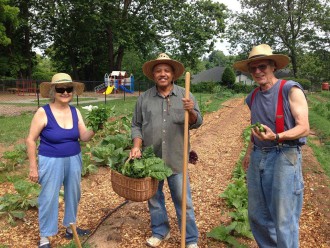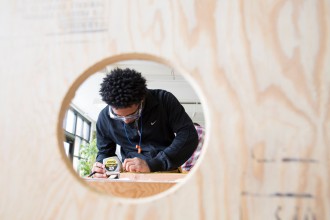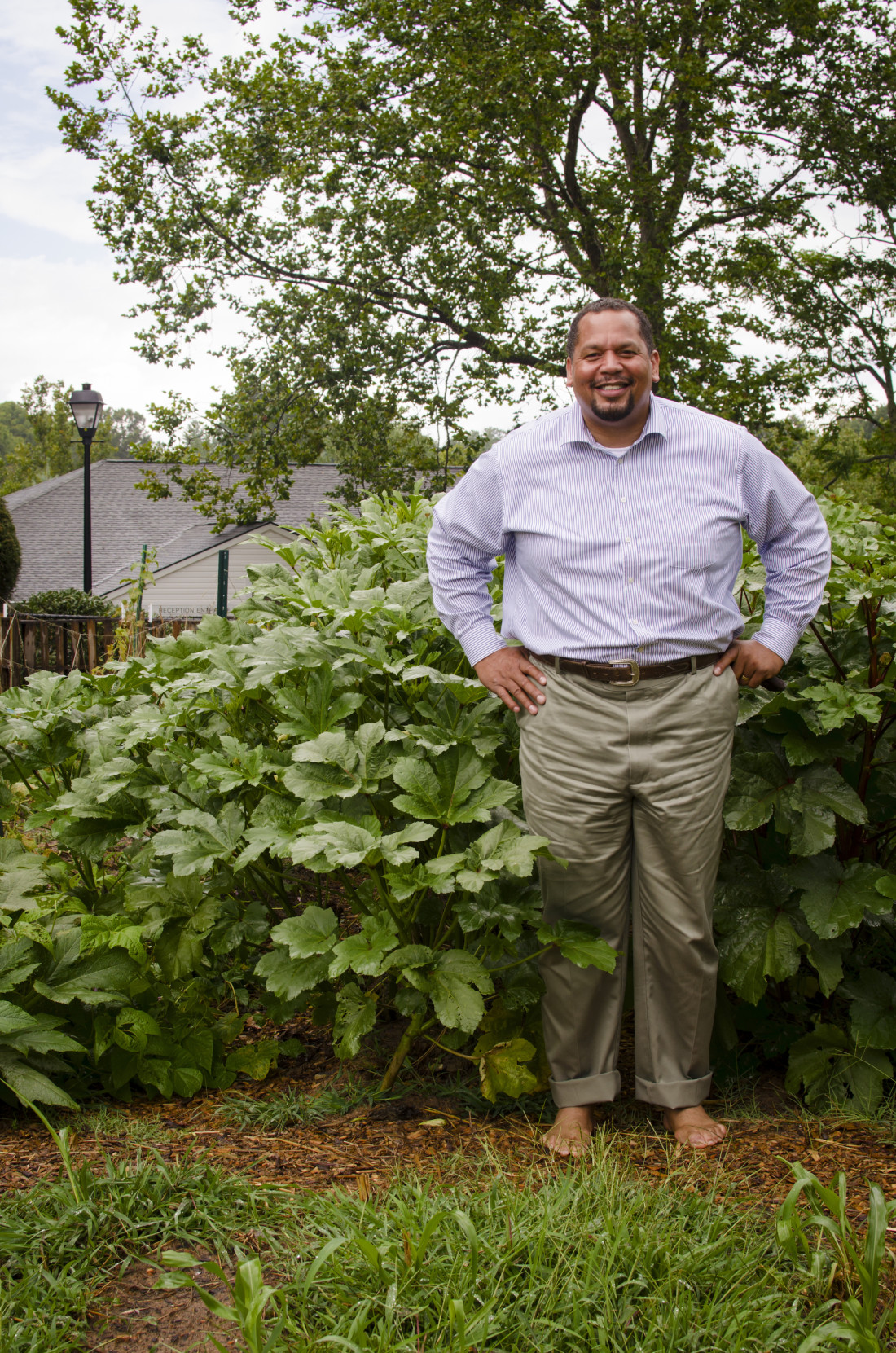George Jones Jr. rolls up the cuffs on his suit pants, slips off his shoes and steps into the wet soil. “You know I gotta go barefoot when I get down here now,” Jones exclaims. “I don’t want to offend anybody, but I gotta go barefoot when I’m in the garden.”
The sun is breaking out from behind the clouds as Jones walks through the Southside Community Garden behind the Arthur R. Edington Center. As the new executive director of Green Opportunities, the green jobs training program that works with low-income Asheville residents, Jones has been spending a lot of his first month on the job getting to know this garden and the other programs that GO runs from Livingston Street.
“There’s four quadrants,” Jones says, pointing along the rows. “All the leafy greens are here, and over there they’ve got the corn and the pole beans. They’ve got okra right there, summer squash over here, and some really nice watermelons coming in slowly but surely.”
As it turns out, Jones is no stranger to a garden. “I was born and raised in Raleigh, but at 15 years old, I moved out to a 100-acre farm out northwest of the city,” he explains. “[The farmer] Mr. Baker was like a surrogate grandfather to me, and he taught me a lot about agriculture, respecting nature, being environmentally conscious, well before the whole movement of permaculture.”
It’s a seemingly good match for the work Jones will take on at GO, where programs have long focused on environmental health in addition to job training in areas such as green construction, sustainable landscaping, weatherization and culinary arts. Jones came on board with the nonprofit in mid-July, replacing interim executive director Kendra Penland. And while he plans to continue the environmental consciousness that was practiced by previous Green Opps leadership — including co-founders Dan Leroy and DeWayne Barton — his tenure will be strongly guided by his business background.
“What I want to push for with GO is for us to be environmentally conscious, but to think about the impact of what we do,” he says. “You can mission-creep and mission-drift if you try to be all things to all people. But if you can become really good — if you can become great — at a few key things, and your community values what you provide, then that’s the win-win.”

Jones’ career has been focused on economic development initiatives, growth strategies for small business, government procurement and workforce training. Much of that included working with women- and minority-owned businesses, developing strategies that would make them more competitive for transportation contracts. It’s work he continued at ED3, the Hendersonville-based development firm he founded with his wife, and with the N.C. Department of Transportation’s Small Business Capacity Enhancement Program. It’s perhaps no surprise then that one of the first programs he’ll spearhead at GO is a new soft-skills training program aimed at women ages 30-50, the demographic that makes up almost 20 percentage of Asheville’s public housing residents and who account for more heads of households than men of the same age group.
The goal of the program is to prepare participants for programs at A-B Tech in nursing, medical billing, medical coding, telemarketing or telehealth. If those careers aren’t what you would associate with green jobs, Jones would encourage you to think again. Part of the retooling he plans to bring to GO is a focus on identifying the in-demand jobs that will provide long-term employment, livable wages and a more sustainable economic situation for GO students.
“We can still be environmentally consciousness, still be focused on equality and diversity, still be focused on providing sustainable employment, but we also need to identify skilled workforce labor that is in demand,” Jones explains. “If someone says, ‘What does GO do?’ we want to be able to say that we provide a highly trained, well-established and well-skilled labor force that is meeting the market needs of the city.”
Creating more stand-alone classes, in addition to the 14-week Built Environment and Kitchen Ready programs, is step one in meeting those industry needs, Jones says. Other steps include creating internships and incubator programs that place GO students in cafeteria jobs at Mission Hospital or retail positions at the French Broad Food Co-op. It’s a process that sees where the jobs are and figures out a way to get low- or no-income residents into those positions.
“Data really needs to be a part of our process,” Jones says. “We can’t just operate on anecdotal information. We have to identify, ‘What are the needs right now?’ There’s an ADA [Americans with Disabilities Act] compliance issue for the city of Asheville. How can we address that need? There’s $400 million worth of construction going on right now in downtown Asheville. What can we do in that process? What can we do in terms of environmental consciousness in terms of that redevelopment in downtown? It’s about leveraging the network and the community need, but also focusing on workforce solutions.”
That data GO is collecting — part of a cultural engagement effort Jones is pushing — will also help the nonprofit identify its students’ needs, he says. “If you have an individual who you think could really benefit from our program, but holistically, they’ve got issues with child care, with access to food, how do get them to the workforce if there are other things that are overwhelming them?” he says. “So, when we’re building our programs and our nonprofit network, we have to look at, holistically, what the student’s life looks like and what his or her needs are.”

Ultimately, the focus has to be on creating a skilled workforce and a pipeline from public housing communities to employment opportunities in a variety of industries, Jones says. “We’re looking at ‘How do you come through GO and learn how to be a part of a crew? How do you go through GO and learn skills that will help you work toward attaining a degree? What are the pathways to building sustainable employment?’” he says. “That’s where my focus is at. If we’re able to build students’ morale and get them to where they’re receiving a living wage, competing in the marketplace and learning a skill, then we’ve been successful.”
It all ties together in a three-pronged overhaul for GO, Jone says — one that combines workforce needs with better community engagement and a stronger support network where GO and its partners continue to “incubate” students as they navigate their first job or college semester.
Internally at GO, Jones and the board of directors are creating other changes too, including hiring new staff members and creating a more clearly defined hierarchy.
“We’ve been kind of a democratic, horizontal operation in the past, but I do think structure is important,” Jones says. “Having a little bit of accountability and responsibility goes a long way, and it’s something we want our students to value too — being focused, being clear on what the objectives are and being clear on what the outcome needs to be.
“So, when they see me coming, you’ll hear all this ‘Mr. Jones’ stuff,” he says with a laugh. “It’s not that I’m a hard disciplinarian, but you do have to have that accountability.”
Disciplinarian or not, you’ll still be able to find Jones in the garden with his shoes off, chatting with students and volunteers and checking on the vegetables. In fact, he’s so comfortable walking barefoot that even if he’s not in the garden anymore, his shoes might be.
“You’re going to lose those shoes to the rain!” calls out garden volunteer Roy Harris, as Jones walks back to the Edington Center. His loafers are still sitting by the arugula.




I commend Mr. Jones and the work being conducted under his leadership. The creation of a pathway for individuals to improve the quality and circumstances of their life is a model that can and should be replicated nationwide. Providing the necessary support to ensure those participants are made to feel of value and an integral part of the process is critical to their success! Excellent Job Mr. Jones! (toes in the soil and all!)